- Home
- Deepak Chopra
Muhammad: A Story of the Last Prophet Page 3
Muhammad: A Story of the Last Prophet Read online
Page 3
“If the only thing that stands between me and a wife is a bath, I have no worries,” Abdullah replied, certain of what he was talking about.
We wended our way home, the old man limping, leaning on the young one’s shoulder.
But even dead on my feet, I heard a sound. A faint rumble that could have been a muffled voice. Somewhere, Zamzam flowed deep in the earth and was waiting to be reborn.
God’s will is done in circles. No mind of man can fathom His hidden design. So, do not mock my obsession with finding the sacred well again. If I ever release its waters and perhaps even take possession of the gold that the thief flung into it, will God reverse His judgment?
“I beseech the blessing hidden in the curse,” I murmured.
“Just as long as I’m not cursed with another day like this,” grumbled Abdullah.
“You’ll go to your aunt’s house tonight,” I said. “Some young marriageable women will be there. Try to control yourself. We wed one at a time.”
Abdullah bowed low, mumbling profuse thanks for the invitation. One visit to a house of women made him as pleased as stealing some spring lambs from a rival tribe out in the hills. He began to whistle a love song.
When we were about to round the corner to our house, I said, “I can make it the rest of the way alone. I’ve sent word that one of your third cousins should run here, to finish the day’s water hauling with you.”
Abdullah’s smile froze.
2
BASHIRA, THE HERMIT
It’s important to ignore the voices. When I first came to this horrible place, I was afraid of going mad. But soon I wanted to go mad with every fiber of my being. The old monk was still alive then, and he heard voices. He said they came from God, but he had lost his mind years ago.
The old monk spent every waking moment writing. At first I was in awe, because I can only write my name. I was taught how by the elder brothers, so that I might sign my contract with Christ, to be his servant for life.
“What are you writing?” I asked the old monk, whose named was Celestius.
“The Bible,” he replied.
He gave me an irritated look. Celestius rarely spoke. The usual sound that came from his mouth was the crunch of his teeth on the flatbread we ate at every meal. Our grinding stone leaves grit in the flour, and his teeth had worn down to stubs.
But I must explain about the Bible. There is no Bible. The length and breadth of Arabia has never seen such a precious object, or if it has, the pagans buried it in the sand or ate it when they got truly desperate—boiled vellum might retain some bit of lamb fat. I myself saw a Bible only once, when it was placed against my forehead in Damascus, the day I gave my life to Christ, our Lord.
Trying to hide my disbelief, I asked Celestius, “Where is this Bible you are copying?” He must have hidden it well. Our cave contained two straw pallets for sleeping and a clay pot for washing. All the cooking had to be done outdoors or the smoke would choke us.
Celestius assumed a crafty look. “Don’t need a Bible,” he said tapping the brown-spotted dome of his bald head. “In here.” He smiled secretly, showing his upper row of stubs.
Well, crazy is as crazy does. If he wanted to copy the Bible out of his head, so be it. I asked him to read a Psalm to me.
“Haven’t gotten there yet,” he said. “They told me to start at the beginning.” And that was the end of the discussion. As punishment for interrupting him, he refused to acknowledge me for a month, as if I were invisible like his Bible.
I used to hear the Psalms through the church windows when I was lost on the street in Damascus. They aren’t all about the valley of death, although there were days I wanted to go there, starving days in the back alleys that smelled of raw sewage. Sewage has its uses if you don’t want someone to find you.
I will lift up mine eyes unto the hills,
From whence cometh my help.
My help cometh from the Lord,
Who made heaven and earth.
The Psalmist must not have seen the hills of Bostra that circle our cave. There’s no help from there.
Or so I thought.
One day Celestius seemed to take longer than usual to unfold his creaking limbs in the morning. I poked him but he didn’t move or let out a grunt. He had died sometime after midnight prayers. From the way his arm lay outstretched in the direction of my pallet, I suppose he had wanted the last rites. A bit late on that one, my brother. I put him in the earth with a rough marker on his grave. He would keep a long time, what with the lack of rain. Eventually a caravan would pass by carrying a Christian, and then the body could be taken back to Damascus for a proper burial.
I didn’t fear loneliness. Actually, it was good to be rid of him. I love my fellow man, as Christ commands me to, but toward the end Celestius was too mad to remember to dress or clean himself. I saw his bony behind once too often. After I buried the old monk, a trader from Tyre came by one day who could read, and I showed him a stack of pages from Celestius’s “Bible.” The trader laughed and said it was complete gibberish. No surprise. The only thing of interest was the last page. On it Celestius had written the same line over and over until his hand faltered and the letters turned to faint squiggles:
When the sun’s face is hidden, God will bring his last prophet.
“Are you sure that’s what it says?” I asked. Because he was my guest, the trader had no reason to lie. I will grant the pagans one thing—they hold hospitality sacred. I had invited him into my cave for food and drink—a proper meal, not just flatbread and grasshoppers. I sell religious trinkets to travelers (with a little work a goat’s shinbone can be made to look very much like a saint’s), and with the money I buy supplies from the caravans. Dates and figs, usually, but also honey, olives, hard cheese, and dried meat. Wine, of course, in clay jars sealed with pitch.
The trader assured me that he had read the line just as it was written, but to be certain he took the page outside, where the setting sun still imparted an amber glow to the hills. When the sun’s face is hidden, God will bring his last prophet. Celestius wasn’t sure about the spelling of the word “prophet,” so he had put in three versions and one of them was right, the trader told me. The trader said he’d be glad to read the other gibberish to me too, but that just meant he wanted more wine. I gave him another cup out of charity, even though my heart sank inside. This man from Tyre had delivered me a world of trouble without knowing it.
God will bring his last prophet. Impossible. The old monk was simply delirious. God has already sent his only begotten Son. The prophecy of Isaiah is fulfilled. Unless…
Unless Jesus has forsaken us.
Unless God has changed His mind.
Unless the Devil has found me in the smallest, darkest, dirtiest cave on the face of the earth.
What a curse when the mind hits upon that tiny exception—unless. It appears like a black mote on the far horizon. And no matter how hard you struggle, the speck grows and grows until one day it swallows up the sky. What could I do? I prayed. I asked God for a sign. One night after thrashing in bed covered in sweat, I rose and burned all the pages the old monk had scribbled. Yet when I got to the last one, fear gripped my heart, and I couldn’t put it to the flame. So either God or the Devil has power I couldn’t resist.
After that I spent my days watching the sky, waiting for the face of the sun to be hidden. A stranger found me that way, squatting on the ground outside my cave.
“Why are you staring at the sun, old one?”
I looked up to see a tall, turbaned man who was as dark as his shadow. Perhaps an Abyssinian. They say that if you cross the sea to their kingdom, which is Christian by the grace of God, there are many Bibles, some covered in cloth of gold. Maybe here was a man I could talk to.
“I’m not staring at the sun,” I replied.
“Good. The sun is the eye of Nabul,” he said. “You’ll go blind if you gaze into it.”
Nabul is one of their countless idols in this forsaken place. The stranger was an u
nbeliever. I got to my feet, so that when I told him to go away, we’d be looking eye to eye. Then I saw something over his shoulder. A cloud had appeared in the sky out of nowhere. In this land where sand dunes roll like an endless sea and rain falls only to moisten the graves of those who hear the Last Trumpet, there was a cloud.
I pointed with my finger. “Is that your caravan, stranger?” Camels and wagons crawled in the distance.
“I travel ahead of it as a scout. Those are traders from Mecca, and not very rich ones, either,” he replied.
I barely heard the words. The cloud, which was not large, cast its ragged shadow on the earth. From up above I could see it clearly. What amazed me was this: the cloud was directly over one wagon in the caravan, and as the camels lumbered along the trail, the cloud moved with them, always shading one particular wagon.
“Who rides in that cart?” I asked.
The black man shrugged. “It could be anyone,” he said. Except the slaves and servants, who were forced to walk. I could see a straggling line of them keeping pace with the camels. I counted. It was a small caravan by the standards of the great ones from Yemen when an engorged ship from the East has unloaded its cargo of silk, iron, perfumes, and spices. I counted no more than two dozen camels and three donkeys.
“You look pale,” remarked the stranger. The next thing I knew, I felt something cool and damp being pressed against my forehead. I opened my eyes and touched my face with trembling hands.
“Maybe you were gazing into Nabul’s eye after all,” said the man. “You fainted.” He pressed the damp cloth to my forehead again, but I pushed him away.
“I have to see,” I mumbled and staggered to the mouth of the cave. Thank God I had not been unconscious for long. The threadlike procession of the small caravan was still in sight down below. And yes, the cloud was poised directly over one wagon. I watched until they were out of sight. Nothing changed. The face of the sun had been hidden, and God was protecting someone with cool shade. The possibility was staggering. I had to find out who was in that wagon.
For the rest of the afternoon I paced restlessly trying to think it through. The Devil could be tempting me. I hadn’t seen the stranger walk up my hill, and I hadn’t seen him depart. He could have been Satan’s minion, able to appear and disappear as he was bidden. But the man hadn’t asked me to renounce God, and he didn’t leave me lying in the sun to die when I fainted. The Adversary doesn’t do good deeds. Then I realized that this logic was ridiculous. If the Devil had found me, I was lost already. He’d gnaw at my soul like a desert rat by tiny, maddening bites until he got what he wanted.
In the end I waved to a village boy passing by with three skinny goats and told him to invite the men of the caravan to my cave for supper. He nodded and ran off. The people around here have a superstitious regard for me. I swept the cave and brought out my best provisions. A rare mood had come over me. I whistled while cracking open the best wine jars, soaking the dates in water to plump them up, and throwing out any fig that had been infested with maggots. This was going to be a kind of last supper. Either God’s word was coming true, or my soul was about to be snatched by madness. One way or another, the end had come.
Folded up under my pallet was an embroidered cloak that signified who I was—not a filthy beggar with matted hair, but a priest. When they sent me into the desert, the Damascene fathers presented it to me. “Never forget who you are,” the abbot said gravely. “And don’t come home until this is your winding sheet.”
I smiled to myself, wrapping the scarlet cloth around my narrow shoulders. Moths had chewed small holes in the wool, but the gold embroidery twinkled in the dimness of the cave. The cloak was still a fine thing. I sat in the midst of the feast I had spread out and waited for sundown. Once or twice I nodded off—the aftermath of my great excitement—until I heard men’s voices coming up the hill.
“Bashira. Are you he?” the head man said when he got to the mouth of the cave. These Arabs are horrible unbelievers, but they speak formally when they come as guests.
I lit an oil lamp and held it close to my face. “Is there another cave waiting for you that is set with a feast?” I asked.
The glow from the lamp illuminated my scarlet robe, giving it what seemed like an inner light. The Arabs looked at each other doubtfully. They believe in all kinds of spirits, especially those who roam the desert after nightfall to suck humans dry of their souls. But the lead man didn’t falter. Seeing the food and drink all around me, he stepped inside with a bow.
They sat in a circle and began to eat. None of them said a prayer or cared two beans that I did. A couple of them splashed the floor with wine as offerings to their idol. The name didn’t matter. Idols were more plentiful than horses or cattle. If you climbed a tree to escape a prowling jackal, you could turn that into your god if you wanted to.
Being guests, the men didn’t attack the food like ravenous beasts, but ate with dignity. I sat silently and watched. Which one was the prophet? It wasn’t long before dignity grew thin. As the wine flowed, the talk grew louder and coarser. To them I wasn’t a holy man, so they spoke freely of women in the streets and their many conquests. The hours wore on. Tongues wagged, then heads nodded. But I kept my gaze alert. Which one? The full moon had sent slanting light into the cave for the first hour, but it had long set under the stark, treeless horizon. I turned to the head man, who had seated himself on my right. He wasn’t sober, but he was still coherent.
“Is there anyone here I should know in particular?”
He looked puzzled, and why not? I had no words for what I wanted to say. I tried again. “I am looking for someone favored by the gods,” I said. “Does any of your clan have a mark upon him?”
“What?” He shook his head in confusion and asked for another cup of wine. I gave it to him and sank back into my gloomy thoughts. Not for the whole evening had I seen a sign of God’s intentions. These were coarse, ordinary traders, drifters across the face of the desert. Someone was toying with me.
The men rose to leave, each helping the other to his feet. They staggered out into the night, which had grown dark and thick without the moon. Torches were lit, and the head man bowed to me. He was about to turn away when he said, “I have put some dates and figs in my bag without asking your permission. They’re for my son. Forgive me.”
I tried to keep my voice from trembling. I asked him why his son stayed away. I had explicitly invited every man of the caravan. He said that they had left behind no men. His son was still a boy. They’d left him behind to guard the animals and raise the alarm at the first sign of raiders.
“Send the boy to me,” I said. “My Lord Christ bids me to offer food to every stranger tonight, without exception.”
To his superstitious mind this was logic enough, not that he had any regard for the name of Christ. The head man gathered his homespun skirts about him and sat down on the ground after barking orders at one of the others. His men bowed and departed down the hill.
“Actually, I’m happy you called for Muhammad,” he said. “I felt guilty leaving him alone when one of the slaves could have watched over everything.”
I remarked that I’d never seen a boy on caravan. They were dangerous affairs, weren’t they?
He sighed. “Just so. My tribe has suffered from death in faraway countries. Our caravans have been cursed. Especially one time.” He was leading to a tale, but suddenly he stopped and looked away.
Half an hour later his man returned, apparently alone. But as he got closer, I saw the outline of a small boy walking behind him. The two approached, and with beating heart I looked at the boy’s face. He barely glanced my way, bowing to his father.
“Abu Talib, I am here to serve you,” the boy said gravely. He looked to be about twelve, short and compact. In the dim glow cast by the cooking fire I couldn’t see his eyes. Only when he was told to greet his host did he turn to me, and then his eyes were cast down to the ground.
“Your father says you are called Muhammad.�
��
It was a simple statement, but the boy hesitated before nodding his head.
“Who are your people?” I asked. Before he could answer, his father interfered. He jumped to his feet and pulled him close. “To you our people are nothing, so why question a boy?”
I looked surprised. “You act as if I might hurt your son. What is it?”
“He’s precious to me. His mother died when he was just barely walking.”
That wasn’t the whole story. These Arabs can take any number of wives, according to their custom. I had a burning need to know about this boy, and so I asked God what to say before he was snatched away. There was only a moment left; the head man wasn’t anxious to stay. Suddenly I saw the truth.
“He isn’t your son,” I said flatly “You’ve been lying. Why?” My voice was clear and strong. “I am asking you as a holy man. God has told me something important, but first I must know the truth.”
The head man grew nervous. A strange thing about the Arabs is that they respect the name of God, despite all their idols. It’s not something they freely talk about, but I’ve been told that they know there is only one God. There was a time when their worship was pure. They even look to Abraham as their father. But over time they fell into idolatry.
“I need the truth,” I repeated. “Who are you, Abu Talib?”
“I am his uncle and head of the clan,” Abu Talib admitted with reluctance. “My lie wasn’t a sin. I am the boy’s protector.”
“So he’s an orphan?”
Abu Talib nodded, and the boy drew closer to him, folding his small body into his uncle’s robe. I knelt down. “Muhammad, a caravan is a dangerous venture, but you’re safe here. Will you speak with me? I implore you. Your fate is important. Or do you know that already?”
I put my forehead to the ground, as if addressing a superior. That would frighten an ordinary boy or make him burst out laughing, but Muhammad straightened up.
“What I know is my concern, not yours,” he said.

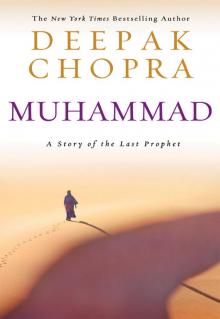 Muhammad: A Story of the Last Prophet
Muhammad: A Story of the Last Prophet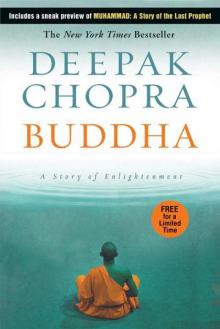 Buddha
Buddha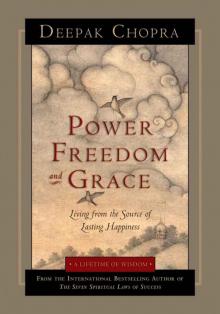 Power, Freedom, and Grace
Power, Freedom, and Grace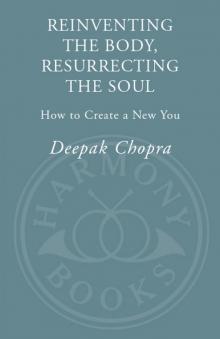 Reinventing the Body, Resurrecting the Soul: How to Create a New You
Reinventing the Body, Resurrecting the Soul: How to Create a New You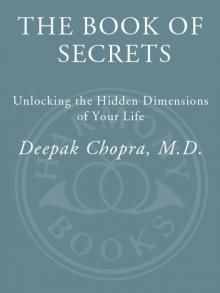 The Book of Secrets: Unlocking the Hidden Dimensions of Your Life
The Book of Secrets: Unlocking the Hidden Dimensions of Your Life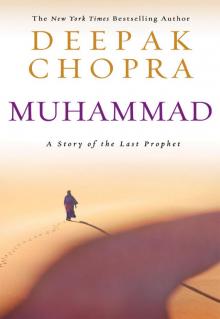 Muhammad
Muhammad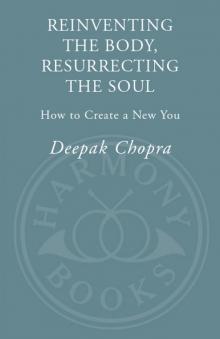 Reinventing the Body, Resurrecting the Soul
Reinventing the Body, Resurrecting the Soul